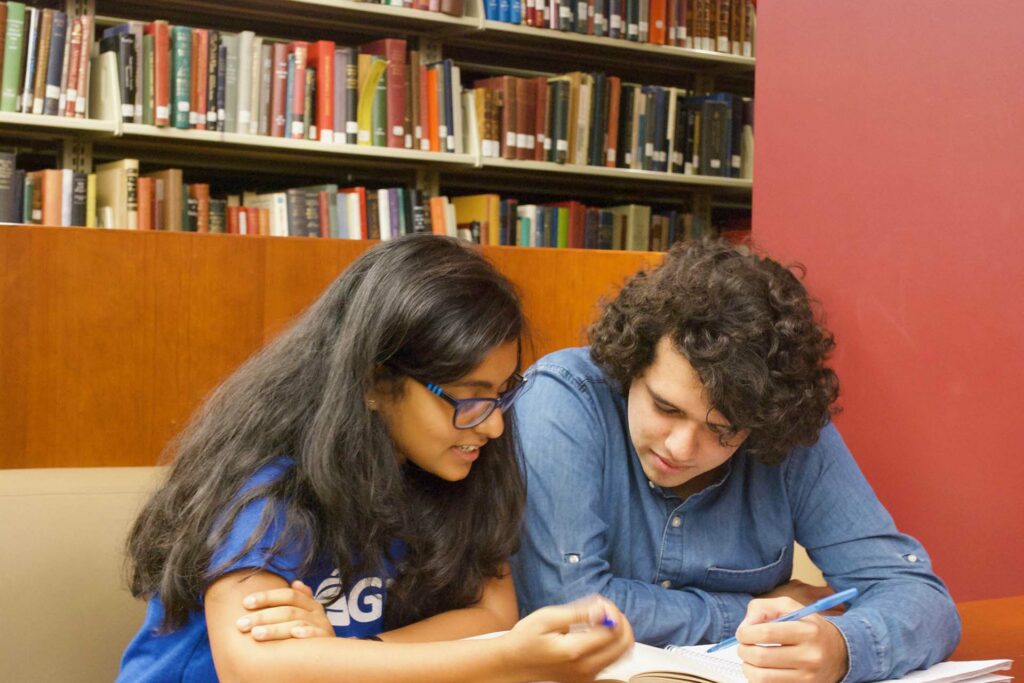By Stephen Wilson
Working over the summer is common for undergraduates, but working on and for your own business is uncommon. Thanks to the Bergh Summer Accelerator (BSA) two student-led teams took the less traveled path and turned summer into a strategic investment.
BSA is a new program of Bradbury Dyer III ’64 Center for Innovation and Entrepreneurship. Thanks to a recent gift from Chip Bergh ’79, president and CEO of Levi Strauss & Co., BSA teams received mentoring, training, and financial support (up to $20,000 per team) over a 10-week period starting this summer.
“We worked with each team of students and developed a plan to establish goals and milestones,” says Dyer Center Director Yusuf Dahl. “Each team received mentorship and advising through a network of Dyer Center faculty, staff, dedicated alumni, seasoned entrepreneurs, and technology experts. All worked to accelerate their progress.”
Meet GoPeer
Team: Ethan Binder ’19, Erik Laucks ’20, and Zura Mestiashvili ’20
Business Vertical: Education
 About page: GoPeer is the premier platform that pairs qualified college students with K-12 students for one-to-one tutoring lessons. The live learning platform features a secured online classroom, face-to-face video conferencing, virtual whiteboards, and saved lessons for easy review and reference.
About page: GoPeer is the premier platform that pairs qualified college students with K-12 students for one-to-one tutoring lessons. The live learning platform features a secured online classroom, face-to-face video conferencing, virtual whiteboards, and saved lessons for easy review and reference.
Key background: GoPeer has been operating from a dorm room corporate office for two years. This past year, Binder was on the road to Boston several times a week to participate in Mass Challenge, a global, competitive business-accelerator program for early stage entrepreneurs. Having already been named a Top 50 on Fire in Rhode Island, GoPeer is reimagining the tutoring industry in hopes to make it more accessible, affordable, convenient, and effective.
Summer goal: Build an online platform. GoPeer had been exclusively focused on in-person tutoring but began to see the value of online options in early winter. It would better serve students and parents in need of tutoring, eliminating the need to jockey schedules, transportation, and commute times. A video chat with real-time screen sharing could help with online classroom tools.
Summer outcomes: First the team had to build the online elements, test the platform, train tutors, and then launch it. The beta version worked well and had great results. The company also adjusted its tutor hiring by investing more into fewer tutors in hopes of better managing, supporting, and retaining them. A key accomplishment was closing on a $265,000 seed round of funding from high-profile investors.
BSA meant: It provided enough to help members of the team remain on campus and work full time on the project in addition to paying for design and server costs, legal fees, and marketing.
Key partner: Sharon DiFelice, director of innovation and consumer insights at Crayola, helped better understand the group’s business model and successes and challenges. Consumer insights was a key area of discussion, in particular, how to gather compelling and honest insights from target consumers to continue to build the business. They discussed different techniques to uncover insights (ethnographic and other qualitative research, quantitative studies, etc.) to better understand target consumers’ motivations and needs.
Meet CherryTree
Team: Jack Lapides ’20, Charley Western ’20, Ryan Parrish ’20, and Richard Magnus ’22
Business Vertical: Agriculture SaaS
About page: CherryTree supports farms and the local food movement by giving small farmers the ability to market themselves to nearby consumers and sell their products online. Users can make purchases of fresh and local produce, meat, dairy, and more through the platform and pick it up directly from farms, markets, and farm stands in their community.
Key background: CherryTree placed third in the Dyer Center’s first Business Plan Competition.
Summer goal: Strip back to beta. CherryTree rebuilt nearly every aspect of its platform, focusing on a scheduling system that allowed farmers to position products at multiple markets at once.
Summer outcomes: Learning how much time the students could put into the work as they hired coders, signed contracts, and developed software to move the business forward. The new platform is live, and the team is fixing bugs while getting more farmers signed up.
BSA meant: Financial support helped the team live, but most of it, over 85 percent, went into the business. Students also could dedicate 8-14 hours a day into every aspect of the build.
Key partners: Tye Gonser ’02, attorney partner at Weinberg Gonser LLP, served as a sounding board—that holistic adviser every business wishes it had at the start who is willing to talk through details, provide advice, and answer common questions that come up when starting and running a business. He focused on identifying goals in order to create a path that aligned with the mission and values. Jared Mast ’04, executive director of Greater Easton Development Partnership, helped talk about the local market given his perspective from opening Easton Public Market, which operates a local farm stand, and his knowledge of Easton Farmers’ Market.
 About page
About page